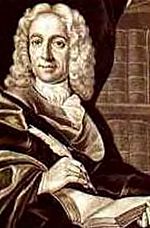Matthias Bel facts for kids
Quick facts for kids
Matthias Bel
|
|
|---|---|

Matthias Bel
|
|
| Born | 22 March 1684 |
| Died | 29 August 1749 (aged 65) |
| Nationality | Slovak |
| Citizenship | Hungarian |
| Occupation | Lutheran priest, writer, historian, geographer, alchemist |
| Spouse(s) | Susanna Hermann |
Matthias Bel (born Matej Bel, 1684 – 1749) was a very smart Slovak Lutheran pastor and scholar. He lived in the northern part of the Kingdom of Hungary, which is now Slovakia.
Matthias Bel was active in many fields. He studied teaching, philosophy, languages, history, and religion. He is known for starting the study of geography in Hungary. He also helped describe different cultures and economies. He was a leading figure in a religious movement called pietism. People often called him the Great Ornament of Hungary.
Contents
Early Life and Education
Matthias Bel was born in Očová, which was then part of the Kingdom of Hungary and is now in Slovakia. His father, Matej Bel Funtík, was a wealthy farmer and butcher. His mother, Elisabeth Czesnek, was a very religious woman.
Matthias Bel described himself as "by language a Slav/Slovak, by nation a Hungarian, by learning a German." In 1710, he married Susanna Hermann, who was from Hungary. They had eight children together.
He went to many schools in places like Lučenec, Kalinovo, and Dolná Strehová. He also attended grammar schools in Banská Bystrica and Bratislava. From 1704 to 1706, he studied theology, philosophy, and medicine at the University of Halle in Germany. After his studies, he became a rector (head teacher) at a school near Magdeburg.
Career and Influence
When Matthias Bel returned to the Kingdom of Hungary, he became an assistant rector and then rector at the Lutheran grammar school in Banská Bystrica. He also worked as a pastor there. Later, from 1714 to 1719, he was the rector of the Lutheran grammar school in Bratislava and a pastor at the German Lutheran church.
He published his articles in a Latin newspaper called Nova Posoniensia. This was the first regular newspaper in Hungary. In 1735, Bel suggested creating a scientific academy in Bratislava.
Matthias Bel spoke Slovak, Hungarian, and German. Most of his writings were in Latin. He loved Hungarian history and language, which showed in his famous work, Notitia Hungariae novae historico geographica.
Matthias Bel passed away on August 29, 1749, and was buried in Bratislava.
Matthias Bel's Important Works
Matthias Bel was a very busy person. He worked as a translator, editor, and publisher of many books.
Religious Works
Bel's main goal was to make the Bible available in a language that ordinary people could understand. He helped re-edit the Bible of Kralice in 1722, which was important for Slovak Lutherans. He also helped publish the Hungarian Bible in 1714 and a New Testament in 1717. He wrote introductions for new editions of other religious books.
He translated and published several important religious works, such as The Compendium of Christian Revelation and True Christianity.
Teaching Methods
As a teacher, Bel wrote books and introduced natural science lessons. He believed it was important to use visual aids and hands-on experiments in education. His modern teaching methods spread and improved the education system throughout Hungary.
Language Studies
Matthias Bel was also a language expert. He was one of the first to study ancient Hungarian writing called Hungarian runes. He also helped develop the Hungarian literary language. He revised and republished a Hungarian Bible translation by Gáspár Károli.
He wrote grammar books for Hungarian, Latin, and German. His book "Der ungarische Sprachmeister" (Hungarian language master) was popular for Germans learning Hungarian. He also wrote about German communities and their dialects in Hungary.
History and Geography
Bel was a pioneer in studying the history of the Kingdom of Hungary. His most famous work is Notitia Hungariae Novae Historico Geographiaca. This huge project was a detailed historical and geographical study of Hungary's counties. Many people helped him with this work.
He planned to publish descriptions of all the counties in Hungary. However, only eleven county descriptions were published during his lifetime. The rest remained as manuscripts because of problems with authorities and printers. In his works, he often wrote about the greatness of the Slavic people, including Slovaks, and their long history in Hungary.
Honors and Recognition
Matthias Bel's work was recognized and respected far beyond Hungary. He became a member of many important learned societies in other countries. These included the Prussian Academy of Sciences in Berlin and the Royal Society of London.
He was even given a noble title by Emperor Charles VI of Austria. Pope Clement XII gave him a special golden medal with Bel's own portrait on it.
Legacy
Today, Hungarian historians are working to publish the county descriptions that were left in his manuscripts. They plan to publish them in 10 volumes. The first volume, which describes the Árva and Trencsén counties, has already been published.
Several places and projects are named after Matthias Bel. The Matej Bel University in Banská Bystrica is named after him. There are also elementary schools in Očová and Šamorín that carry his name. The large Slovak encyclopedia, Encyclopaedia Beliana, is also named in his honor.
 | May Edward Chinn |
 | Rebecca Cole |
 | Alexa Canady |
 | Dorothy Lavinia Brown |

